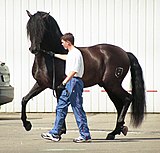33 Male, Female, Adult, Andalusian Horses for Sale
showing results 1 - 10 of 33
price: $15,000
Yegua Espaola Preada de Caballo Perlino 17 manos
Yegua Espaol con Registro de Espaa Disponible en CALIFORNIA Se hacen envos a Texas Alaska Mexico Florida Arizona Georgia Virginia Washington Chicago North Carolina y todas partes Tel o WhatsApp8183... SEE MORE DETAILS found on Equine NowLos Angeles, CA, United States
price: $5,500
Sensible Reg 12 Andalusian12 Kiger Mustang Bay Mare
Reg. twelve Andalusian 12 Kiger Mustang Bay MareVideo myself riding and I havent ridden for 6 monthsdue to medical. I have more video clips of my trainer riding her. Images Grey Sire was FEI level ... SEE MORE DETAILS found on Equine NowLewiston, ID, United States
price: $10,000
RDL Promesa ORO
UNDER SADDLE 1.5yrs RDL Promesa ORO 2015 Gray Warlander twelve Andalusian Mare Promesa promise in Spanish is a triple National Champion half Andalusian Warlander. Her dam is a black Friesian mare M... SEE MORE DETAILS found on Equine NowTaylor, TX, United States
price: $4,900
Broke Sound Sane Half Spanish Andalusian Excellent Mother Athletic
Lovely half Spanish Andalusian mare. Broke and super fun to ride! Very athletic and 100 sound. This mare will happily ride all day long. Ive ridden her English and Western. Shes had a rope thrown o... SEE MORE DETAILS found on Equine NowDecatur, TX, United States
price: $30,000
Stunning 2010 PRE Black Imported Revised Mare
QUINCEAERA JOCHA Stunning 2010 PRE Black Imported Revised Mare Best Movement Resv. National Champion! This captivating imported 16H mare has not only superb conformation she is an outstanding produ... SEE MORE DETAILS found on Equine NowRaleigh, NC, United States
price: $20,000
Tall Elegant PRE mare by National Champions Qualified Sire Dam
ZENDAYA By Devon Champion Qualified Sire and Natl Champion Qualified Dam Zendaya has the beauty of her ANCCE Qualified national champion dam and the imposing size and presence of her imported ANCCE... SEE MORE DETAILS found on Equine NowRaleigh, NC, United States
price: $9,000
Beautiful mare
Exquisite Andalusian mare. four years old she is broke to ride but hasnt been started in my discipline. Terrific manners not a single bad bone on this beauty. SEE MORE DETAILS found on Equine NowMiami, FL, United States
price: $4,000
Andalusian Gray Mare With Cream Gene Her Name is Slugger Great Breedlines
VERY PRECIOUS MARE WITH GOOD MOVEMENT AND CONFORMATION HAS 1 CREAM GENE AND SHE HAS PRODUCED two PERLINO BABIES SHE IS PRICED FOR FAST SALE YEGUA CON GENE CREMA YA PARIO DOS CRIAS PERLINAS CON PREC... SEE MORE DETAILS found on Equine NowChino, CA, United States
price: $32,500
Tormenta del Sol
Description Black balanced highquality PRE mare ready to for the serious breeder on producing worldclass highquality PRES. Ready for a serious dressage rider that wants to go all the way or wants a... SEE MORE DETAILS found on Equine NowVero Beach, FL, United States
price: $17,500
Safe Amateur Dressage Mount Solid 2nd Level
Diva KBC 2005 IALHA registered Andalusian mare 15.3H Diva is a really sweet in your pocket mare. No mareish behaviors. Solid second level. Schooling some third level with potential for more. Excell... SEE MORE DETAILS found on Equine NowFrisco, TX, United States
Sale by Discipline
Sale by Color
More information on Andalusian


The Andalusian, also known as the Pure Spanish Horse or PRE (Pura Raza Española), is a horse breed developed in the Iberian Peninsula. Its ancestors have been present on the Iberian Peninsula for thousands of years. The Andalusian has been recognized as an individual breed since the 15th century, and its conformation has changed very little over the centuries. Throughout its history, it has been known for its prowess as a war horse, and was prized by the nobility. The breed was used as a tool of diplomacy by the Spanish government, and kings across Europe rode and owned Spanish horses. During the 19th century, warfare, disease and crossbreeding reduced herd numbers dramatically, and despite some recovery in the late 19th century, the trend continued into the early 20th century. Exports of Andalusians were restricted until the 1960s, but the breed has since spread throughout the world, despite still-low population numbers. , there were over 75,000 registered living Andalusians worldwide.
Strongly built, and compact yet elegant, Andalusians have long, thick manes and tails. Their most common coat color is gray, although they can be found in many other colors. They are known for their intelligence, sensitivity and docility. A sub-strain within the breed known as the Carthusian, is considered by breeders to be the purest strain of Andalusian, though there is no genetic evidence for this claim. The strain is still considered separate from the main breed however, and is preferred by breeders because buyers pay more for horses of Carthusian bloodlines. There are several competing registries keeping records of horses designated as Andalusian or PRE, but they differ on their definition of the Andalusian and PRE, the purity of various strains of the breed, and the legalities of stud book ownership. At least one lawsuit is in progress as of 2010 to determine the ownership of the Spanish PRE stud book.
The Andalusian is closely r
read more on WikipediaAndalusian Prices
Andalusian Listings Count